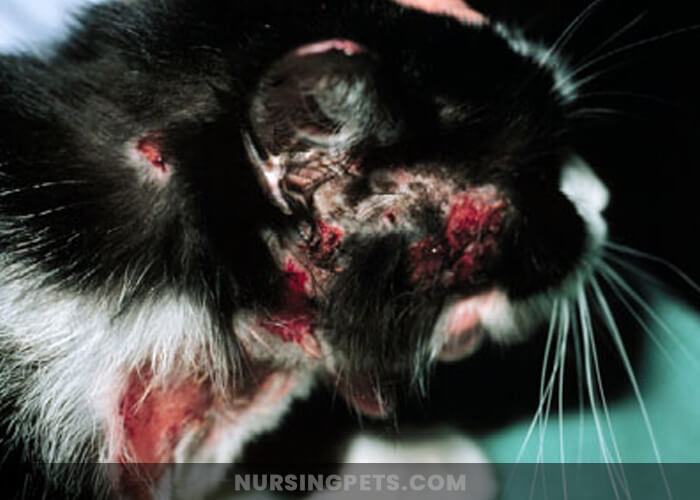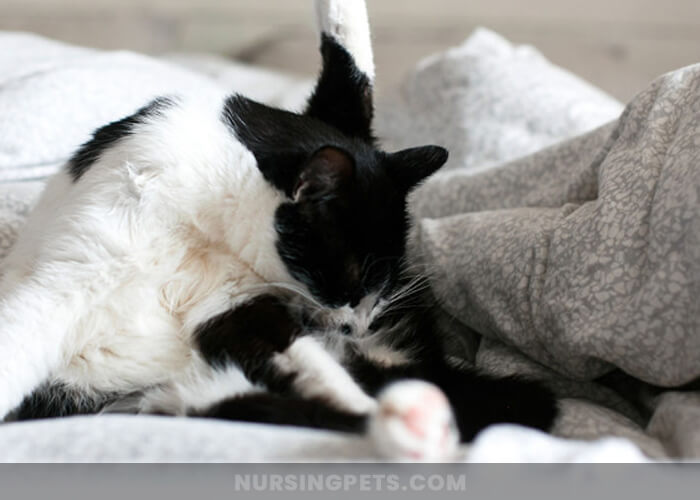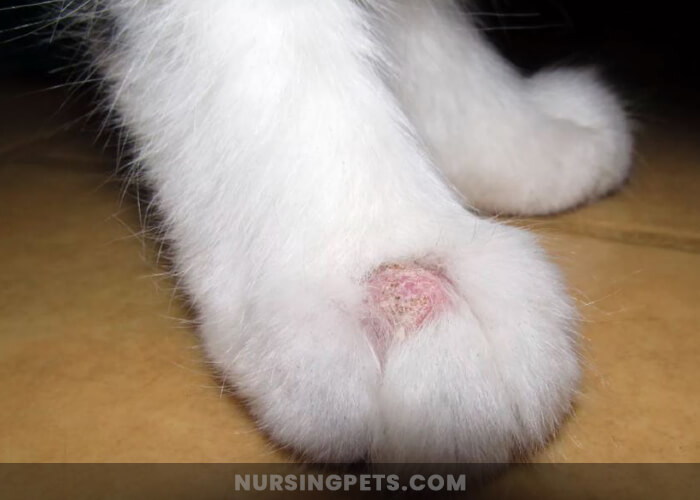How To Stop A Cat From Licking Its Fur Off? Nursing Pets
Is your cat excessively grooming itself, licking its fur off? If the answer is yes, then you’re now in the right place. Hi, there! Today, I’m going to be talking about how to stop a cat from licking its fur off.
If you have a pet cat that is licking its fur off over and over again, you can stop it from licking by putting an e-collar on its neck. It is not always the best solution as it can cause stress and discomfort for the cat. Covering wounds with bandages may also prevent a cat from licking, but ensure that the bandages are not too tight and do not restrict the cat’s movement or circulation. Also, you can try a bitter spray or ointment on spots where your cat is overgrooming.
Apart from that, there are several techniques to prevent your cat from licking its fur. Before solving this problem, you have to know why cats lick their fur exceedingly. Now Let’s discuss cat-licking problems and their solutions below.
Handy Hint: To read more about cats, visit our other article about:
What Does It Mean When Your Cat is Licking Its Fur Off?
Your cat can lick its fur to remove dirt and odors, but when the cat does it excessively, this is not a good sign for the cat. This can happen due to some psychological or medical reasons. Let’s check out why your cat may lick its fur off:
Medical Reasons
Parasites: When it comes to cat-licking behaviors, many parasites, such as fleas, ticks, and mites, cause intense itching all over the cat’s body. In short, these irritating things prompt a cat to lick its fur off.
Whenever you notice that your cat is obsessively licking its lower back, then parasites may cause serious hassle to your cat.
Allergies: Many cats lick their fur off because of excessive allergies, also called Allergic Dermatitis. These skin diseases can be caused due to dust, mold, certain food, and hypersensitivity to parasites (for example, fleas).

Consequently, cats feel itches that prompt them to lick their fur off.
Dry Skin: Sometimes, cats lick their fur off due to their dry skin. In dry winter, they usually don’t drink much water. That’s why they feel nutritional inadequacies that make them lick their fur for relief.
Pain: When you notice that your cat is licking its fur off in the same area again and again, it may experience pain in that spot. For example, if your cat licks its abdominals over its bladder repeatedly, it may want to get relief from pain.
Wounds and Infections: Your cat may get wounded due to the bite of another cat, and it may get infections on the spot. This is why your cat could lick its fur off. Oftentimes, the cat can lose its hair in the wounded area. It licks the area to get relief from irritation.
Anal Gland Problems: In case you notice that your cat is often licking near its rectum, it means the cat has anal gland problems. Apart from licking the anal gland, your cat may lose hair around that area.

Ringworm: In the medical field, Ringworm, also called Dermatophyte Fungi, can be another reason for cat-licking behaviors. If your cat is licking a spot repeatedly, it probably has Ringworm, and it licks the area to get relief from itching.

Psychological Reasons
Displacement Behavior: Whether your cat is confronted with another cat, it may become stressed to think about attacking, running, or hiding. Being stressed in that situation is called displacement behavior. Due to this reason, your cat could lick its fur off to reduce its stress level.
Obsessive-Compulsive Disorder: When the displacement behavior continues to the extreme level, it becomes an obsessive-compulsive disorder (OCD). For instance, if another cat bullies your cat repeatedly for a long, your cat may go through a compulsive disorder.
Psychogenic Alopecia: In case you notice that your cat is continuously licking its fur off in the chest, back, or legs or it pulls the hair out with its teeth and injures itself, it means your cat may go through a psychological problem called Psychogenic Alopecia.
This may happen to your cat for many reasons, including the absence of a specific family member, the arrival of a new family member or a furry friend, moving to a new apartment or house, or moving the litter box to another location.
How to Stop Your Cat from Licking Its Fur Off
Preventing your cat from licking depends on providing proper treatment for specific problems. Once you’ve known your cat’s problem, you can keep your cat from licking its fur off by following the tips below.
Tips 1 – Cover Wounds with Bandages
Whenever your cat is licking its fur off due to wounds and infections, you should bring it to the animal hospital so that the doctor can cover the wounds with bandages. If the cat has wounds on the torso, you can put an infant t-shirt on the front half of the cat’s body using a sticky tape strip.
Tips 2 – Apply a Special Solution to Your Cat
An e-collar can be one of the most useful ways to stop your cat from licking its fur off in some areas. You just have to put an e-collar on the neck of your cat. This lampshade-like thing surrounds your cat’s neck and eliminates fleas and ticks from your cat’s body.
If you’re looking for the best E-collar in the market, you can check this product (the link will take you to Amazon).
Tips 3 – Use Medications According to the Veterinarian’s Prescription
Depending on how much your cat damages its skin by licking, you should use medications, such as antibiotics, antihistamines, or steroids, as per the veterinarian’s prescription. For the cat’s psychological problems, the veterinarian may prescribe clomipramine or amitriptyline to fight stress.
Tips 4 – Make an Appointment with a Specialized Veterinary Dermatologist to Eliminate Allergies
Your cat may have allergies to fleas and some specific foods. If so, then make an appointment with a specialized veterinary dermatologist that can test your cat to determine allergies. Once the veterinarian has tested your cat, he/she could prescribe some medications to your cat.
If food allergies are the problem, the allergenic foods that the veterinarian prohibits you from feeding your cat should be avoided for at least the next 6 weeks.
Tips 5 – Apply bitter spray or ointment
Try a bitter spray or ointment on spots where your cat is overgrooming. If your kitty tends to focus its overgrooming on a particular spot—like an itchy wound or an infected area—then a bitter spray can be a good temporary option while you treat the underlying issue
Tips 6 – Provide Proper Treatment to Eliminate Psychogenic Alopecia
Whenever your cat has any symptoms of psychogenic alopecia, let your veterinarian diagnose the exact problem and confirm whether your cat has psychogenic alopecia or not. After that, figure out why your cat is feeling stressed and anxious.
To relieve your cat’s stress, you can play some interactive games with it. This helps the cat increase a positive experience with new things.
Frequently Asked Questions (FAQs)
1. How can you tell if a cat has a ringworm?
When a cat has Ringworm, you’ll see some signs of the Ringworm on the cat’s body; for example, circular spots of hair loss, crusting, reddening of the skin, etc.
2. How Long Does it Take for Cat Fur to Grow Back?
For a short-hair cat, you will see that it takes not more than 3 months to grow the hair back. For a long-haired cat, 3 to 6 months is the period of growing the hair back.
3. Why is My Cat’s Fur Not Growing Back?
There are several reasons why a cat is not growing its fur back. Assuming that your cat doesn’t get proper food, it might not grow fur back. Besides, your cat may not be growing its fur back without growth hormone, protein, and vitamin B.
On top of that, your cat may not grow fur back due to excessive bacteria in the fur. That’s why you should consult with a veterinarian.
Final Words
Although you know how to stop a cat from licking its fur off, you need to determine what problem your cat goes through. Your cat might be licking its fur due to alopecia or hair loss. A hormonal imbalance or an unhealthy diet may lead it to lose its hair.
Whatever the reason is, your veterinarian can diagnose the condition of your cat. He/she can understand what happens to your cat and what treatments the cat requires. Keep in mind that solving the problem may take some time. So, be patient.

